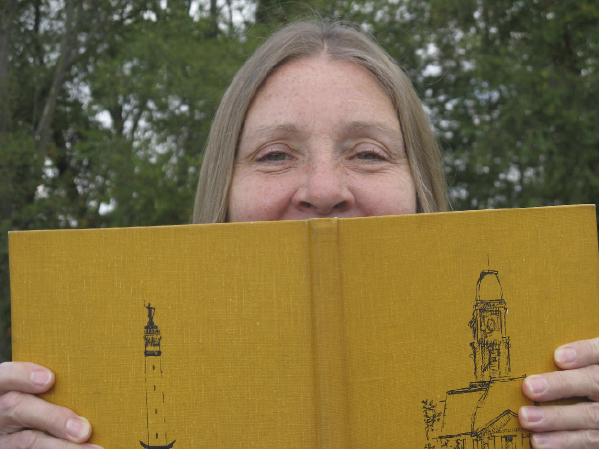The Arcadia Fiber Basket Company

I haven’t written anything about Arcadia for quite a while, so I was pleased when I recently ran across an item in an old Noblesville Daily Ledger that referred to the Arcadia Fiber (or “Fibre,” depending on the source) Basket Company.
I’m familiar with Arcadia’s glass factory, the canning factory, and the cheese factory, but the basket factory was new to me. After doing a little research, I realized I’d found another column.
The owner of the company was Lee Sowers — or Colonel Lee Sowers, if you prefer. Sowers started out as an auctioneer in the early years of the 20th century.
The appeal of auctioneering must have worn thin for him, however. By the early 1920s, he was working as a traveling salesman for the Roann Basket Company of Roann, Indiana. That’s probably what inspired him to open his own basket company in Arcadia in the spring of 1924.
Sowers’ handy, lightweight baskets were designed for purposes such as housewives’ daily shopping trips, but they were also a convenient way for merchants to advertise.
The factory, located on West Main Street, consisted of two large rooms.
In one room, the baskets were assembled out of pre-cut cardboard, then cottonwood handles and top bindings were attached with staples, and the handles and top bindings were dyed red or green.
The other room was used for storage and contained a printing press that printed advertisements on the cardboard from which the baskets were made. Each business that sold the baskets designed its own ads.
According to the Ledger, by the fall of 1924 the factory was producing 5,000 baskets a week.
But, baskets were only the beginning.
In early 1926, new machinery was added to allow the factory to also manufacture “The Sun Shade Motor Cap” for “autoists.” This was a skeleton cap (these days we’d probably call it a baseball cap) with a green visor that was constructed of imported Japanese straw braids.
Within a few months of the caps’ introduction, Sowers’ 12 employees couldn’t keep up with the orders, even though they were producing an average of 1,400 caps a day and working until 9:00 p.m. every evening.
Later that same year, Sowers patented yet another novelty product, the “At-A-Glance Auto Road Map.” This consisted of a metal case in which road maps for four states adjoining the one in which the owner lived were wound around two rollers.
Suction cups on the back of the case held it to a windshield — or wherever else the driver chose to place it — while a large, powerful magnifying glass on the front of the case permitted drivers to easily see 75 to 100 miles of road before they had to turn the rollers to another section of the map.
The device was a hit at the Indianapolis Auto Show in early 1927 and might have had a bright future if not for the Depression.
According to “A History of Arcadia, Indiana,” toward the end of the 1920s or early ‘30s Sowers started to sense hard times were ahead and decided to sell his factory while it was still profitable.
Unfortunately, the man to whom Sowers sold the business — lock, stock and barrel — declared bankruptcy before Sowers could cash the check. Sowers lost everything he’d put into the basket factory.
He just moved on to other inventions.
In the early 1930s he manufactured and sold windshield wipers and in 1938, he organized a corporation to sell a new gadget he’d patented — a can opener with a spout that allowed liquids to be poured without dripping.
Neither of these devices seems to have generated the buzz the basket factory did, though.
Thanks to Nancy Massey for her research help.
– Paula Dunn’s From Time to Thyme column appears on Wednesdays in The Times. Contact her at younggardenerfriend@gmail.com
